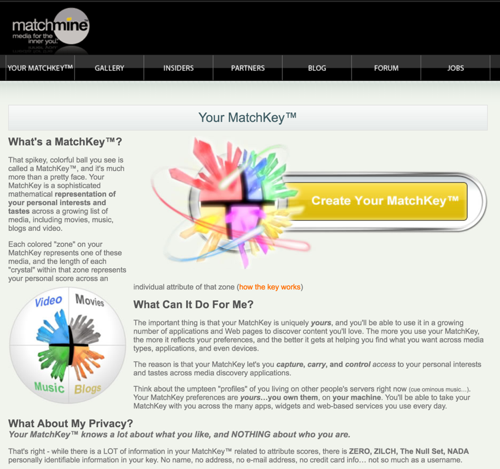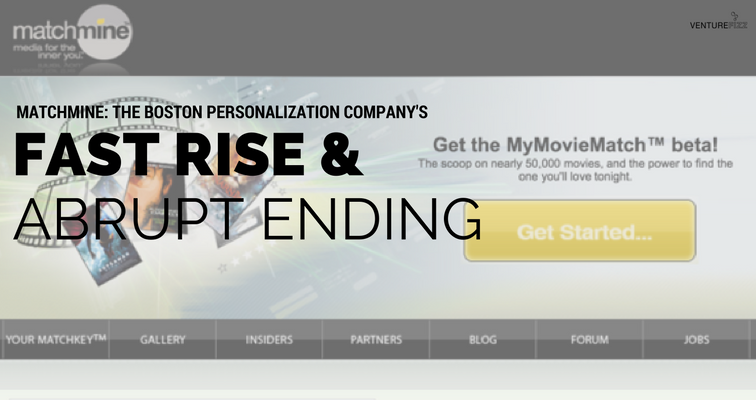In today’s modern era of connected web services, APIs, and apps, why is it that personalized recommendations are still a siloed, homebuilt solution for media companies?
If you have an account on Amazon, Pandora, iTunes, Netflix, Spotify, YouTube, or any other service, you have to train each one to learn your personal tastes.
Wouldn’t it be amazing if there was a product where you could plug into new services andmagically, it would already know what you like or don’t like? Imagine if you signed up for a new account on Hulu and it immediately started recommending the right TV shows for you.

THE HISTORY OF MATCHMINE
The history of the company and technology goes back to some work that was being done by the New England Patriots organization. The Patriots have always been on the cutting edge in terms of how they leveraged technology and digital media to improve the fan experience. The organization was the first professional sports team to launch an official website and then offer streaming video.
Trent Adams, who was the Chief Innovator of the Kraft Group Sports Properties, originally came up with the idea to connect people to things they found interesting through an attribute-based system. Most recommendation systems work via collaborative filtering, meaning if a lot of people like A, B, and C, and you find someone else who likes A and B, they’re likely to like C as well. Collaborative filtering is popular because it’s easy. The algorithm doing the predicting doesn’t need to know anything about the particular items it’s recommending, just who likes what.
An attribute-based system takes the opposite approach, relying on a pre-determined schema of “attributes” for each and every item in the consideration set, and using an algorithm to spot patterns in the data that have predictive value. Pandora’s music genome project is an example. So is the system created by Boston-based Echo Nest, acquired by Spotify in 2014.
Adams pitched the idea to Jonathan Kraft, who liked the idea and wanted to commercialize it.
Mike Troiano was then signed on as the company’s CEO. Troiano remembers meeting with Jonathan Kraft, Robert Kraft, and Adams to discuss this new spin-off company. After exploring more of the details on the idea and technology, Troiano decided that it was too good of an opportunity to pass up.
The next steps was then focused on figuring out how to make the technology work and how to build out a business model.
MatchMine added Jim Butler as CTO and VP of Engineering, then Scott Oddo as VP of Science to help commercialize Adam’s model and build a platform around it. Troiano and his team focused on figuring out the market and revenue opportunities.
“There was a big network effect in the underlying science, in that the more data we had, the better at predicting preference we would become,” said Troiano. “To get up the curve faster we hit on the idea of embedding the technology on different third party sites, and set out on a biz dev exercise to sign them up.”
Here's a flashback video which explains the product:
On the business side of the equation, MatchMine would make money by allowing publishers the ability to deliver highly targeted ad impressions to consumers and MatchMine would take a percentage of the revenue. CNET’s Rafe Needleman covered the story, saying the company now had both an underlying technology and a business model that made sense.
One of the key value propositions for consumers was MatchMine’s respect to one’s privacy. Although MatchMine knew a lot about what you liked, it didn’t know who you were, having deliberately excluded personally identifiable information (PII) from the MatchKey. Back then, the social media landscape was still emerging and consumers were not accustomed to sharing personal details with websites.

MatchMine went on to raise $10M from the Kraft Group in September 2007 and the team grew to about 45 employees. The company’s VP of Marketing, Michelle Heath, has fond memories of the company.
“It was an interesting challenge to market something that was abstract," said Heath. "You couldn’t touch it or hold it, but your MatchKey was something you could interact with digitally."
The company had a lot of momentum, but there was a major factor outside of its control which would ultimately bring it down: the financial crisis of 2008. The credit crunch hit every industry, while the infamous R.I.P. Good Times slidedeck from Sequoia Capital made the rounds across the tech industry. A tough decision was made to shut down MatchMine.
It was an incredibly difficult time for Troiano. Based on the circumstances at hand, he tried to handle the situation as humanely as possible. He went on to write a blog post about the final day of the company and included links to the team, hoping that other companies would scoop them up quickly.
“Although it didn’t determine our outcome, we were wrong about how people felt about privacy," Troiano said, looking back. "It turned out consumers were happy to share their personal info on the internet, which facebook first proved and then took advantage of to great effect.
"We aspired to assemble a slide of the advertising juggernaut they built, but pulled the plug before we really got rolling," he added.
There are still times when I think back about MatchMine and the MatchKey I had set up. Although I didn’t have enough time to build an emotional attachment to it, I do believe the technology was very meaningful and I’m surprised another solution hasn’t solved this problem of personalize recommendations. It would be a much better experience for consumers. Viva la MatchMine...
Keith Cline is the Founder of VentureFizz. Follow him on Twitter: @kcline6.
Images via Michelle Heath and the Internet Archive.

